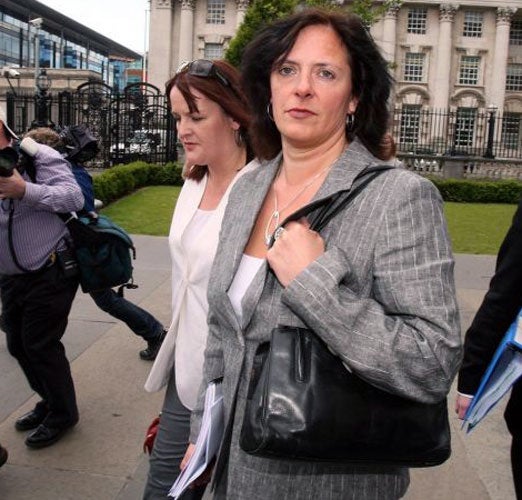Prison or death: the choice facing editor with a hotline to the Real IRA
Journalist tells court she fears for her life if she is forced to hand over information about paramilitaries

A journalist told a court yesterday that she faced being assassinated by republican terrorists if she complied with a police demand to hand over notes which could identify members of the Real IRA.
Suzanne Breen, the Belfast-based northern editor of the Sunday Tribune, received the Real IRA claim of responsibility for the murders of Sappers Mark Quinsey and Patrick Azimkar, who were killed at the gates of Massereene barracks in Antrim on 7 March. She later conducted an interview with a member of the group.
Police are demanding under the Prevention of Terrorism Act that she hand over her computer, telephones, notes and any other material relating to two stories she wrote about the Real IRA in the wake of the killings.
If the court rules that she must hand over the notes and she refuses, she faces being sent to prison for five years.
Ms Breen told the Belfast Recorders Court that the dissident republicans would regard any co-operation by her as an "act of collaboration" with British forces. Her legal team said her right to life under the European Convention on Human Rights had to be respected.
She said the Real IRA was "more than capable" of murdering her and her family if she co-operated. She said a contact connected to the Real IRA had told her: "You know what co-operation with the PSNI means."
She said the message could only represent a death threat to her and her family and she was not prepared "to place my life at risk and that of my 14-month-old child and my partner".
In an article, Ms Breen said: "I face up to five years imprisonment for not complying with police demands. I believe the PSNI's action is politically motivated. The force is under huge pressure to be seen to be doing something post-Massereene. It's much easier to go after the messenger than those behind the message. Another objective could be to discourage other journalists from covering controversial stories and interviewing republican dissidents." Ms Breen told the court that the National Union of Journalists code of conduct made it clear that confidentiality for sources should always be protected. "Our job is to gather information and put it in the public domain," she said.
A campaign in support of her refusal to hand over material has grown in recent weeks with hundreds of journalists, academics and figures in the arts signing a petition organised by the National Union of Journalists.
Prominent journalists including the former Mirror editor Roy Greenslade, BBC Panorama's John Ware and the Sunday Times journalist Liam Clarke have given evidence for Ms Breen.
Ms Breen's case has wider ramifications for press freedom. Amnesty International has written to the Northern Ireland Secretary, Shaun Woodward, expressing "serious concerns" about the case, which it said highlighted the risks to investigative journalism.
Patrick Corrigan, Amnesty's Northern Ireland director, said: "There are concerns here about possible violation of Suzanne Breen's human rights. By using anti-terrorism legislation and the use of secret evidence, the government has deprived her of the right to challenge evidence used against her."
Judge Tom Burgess, the Recorder for Belfast, is to deliver his ruling next week. Colin Duffy, a dissident republican from Lurgan, Co Armagh, has been charged with killing the two soldiers.
Subscribe to Independent Premium to bookmark this article
Want to bookmark your favourite articles and stories to read or reference later? Start your Independent Premium subscription today.

Join our commenting forum
Join thought-provoking conversations, follow other Independent readers and see their replies